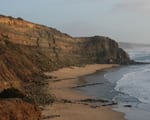The New York Times has written about the research of SMU religious studies expert Mark A. Chancey. A recent report by Chancey, “Reading, Writing & Religion II,” found that most of the 60 public school districts in Texas that offer Bible study courses aren’t meeting a 2007 state law mandating that the courses be fair as well as academically and legally sound. The March 1 article by Mark Oppenheimer, “In Texas, Public School Bible Classes Inch Toward Evangelism,” quotes Chancey and cites his research.
Chancey prepared the report for the Austin-based education watchdog group Texas Freedom Network. His study uncovered bias, factual errors and insufficient curriculum standards in Texas public school Bible courses.
An SMU Religious Studies professor, Chancey recommends the Texas State Board of Education develop Bible course curriculum standards and the Texas Education Agency be allowed funds for a teacher training program.
“As a biblical scholar and especially as a parent, I want our state’s public schools to take the study of the Bible’s influence as seriously as they do the study of science or history,” Chancey told The Dallas Morning News. “Academically, many of these classes lack rigor and substance, and some seem less interested in cultivating religious literacy than in promoting religious beliefs. Their approach puts their school districts in legal jeopardy and their taxpayers in financial jeopardy.”
Chancey, a professor in SMU’s Dedman College of Humanities and Sciences, has devoted considerable attention to the constitutional, political and academic issues raised by religion courses in public schools.
EXCERPT:
By Mark Oppenheimer
The New York Times
It may be a little late for the holiday of Purim, but this coming Tuesday, in Eastland, Tex., Gay Hart will be baking hamantaschen — the traditional doughy, triangle-shaped pastries accented with dollops of prune, Nutella or some other delectable paste — for the mostly Protestant students in her class on the Bible at Eastland High School. Her curriculum also includes latke recipes for Hanukkah, “challah-days” and the Hebrew melody “Hava Nagila.”Mrs. Hart, a Baptist, offers such tidbits of Jewish folk culture to help make her class, offered at a public school, welcoming to people of all beliefs. But according to a new study by Mark A. Chancey of Southern Methodist University, such efforts are not enough to make her class pass Constitutional muster.
Dr. Chancey asserts that Mrs. Hart’s class, while offering what he calls a “sympathetic appreciation” of differing points of view, is taught from an evangelical Christian perspective and probably runs afoul of the Constitution.
And Dr. Chancey says that Mrs. Hart, 77, is not alone in using a high school elective to pole-vault the wall between church and state. “Reading, Writing and Religion II,” released Jan. 16 by the Texas Freedom Network Education Fund, a watchdog organization focused on the separation of church and state, is Dr. Chancey’s second study of public school Bible courses in Texas. He wrote the first in 2006, after becoming intrigued by a lawsuit in Odessa, Tex., brought on behalf of a Jewish student concerned about her public high school’s evangelical Bible curriculum.
That case was eventually settled, but in 2007, Texas passed a law requiring school districts to pay attention in their curriculums to religious literature, including the Bible, and its “impact on the history and literature of Western Civilization.” The requirement can be met through classes specifically on the Bible or through readings in other classes, like social studies or English.
There has long been disagreement about the legitimate place of religion in student-led and extracurricular activities, like after-school prayer groups, and at public school sporting events. But the new trend is to push the Bible into the heart of the instructional day. Since 2006, public schools in four other states — Arizona, Georgia, Oklahoma and Tennessee — have passed laws similar to the one in Texas, and North Carolina is considering such a bill. South Carolina allows students to receive credit for Bible courses taken off campus, for example, at a church or a Christian college.
Follow SMUResearch.com on Twitter.
For more information, www.smuresearch.com.
SMU is a nationally ranked private university in Dallas founded 100 years ago. Today, SMU enrolls nearly 11,000 students who benefit from the academic opportunities and international reach of seven degree-granting schools. For more information see www.smu.edu.
SMU has an uplink facility located on campus for live TV, radio, or online interviews. To speak with an SMU expert or book an SMU guest in the studio, call SMU News & Communications at 214-768-7650.

 Study: Most Texas ISDs that are teaching the Bible are skirting 2007 state law
Study: Most Texas ISDs that are teaching the Bible are skirting 2007 state law Study finds Jurassic ecosystems were similar to modern: Animals flourish among lush plants
Study finds Jurassic ecosystems were similar to modern: Animals flourish among lush plants SMU contributes fossils, expertise to new Perot Museum in ongoing scientific collaboration
SMU contributes fossils, expertise to new Perot Museum in ongoing scientific collaboration 100 million-year-old coelacanth discovered in Texas is new fish species from Cretaceous
100 million-year-old coelacanth discovered in Texas is new fish species from Cretaceous Academic achievement improved among students active in structured after-school programs
Academic achievement improved among students active in structured after-school programs Texas frontier scientists who uncovered state’s fossil history had role in epic Bone Wars
Texas frontier scientists who uncovered state’s fossil history had role in epic Bone Wars Observed! SMU’s LHC physicists confirm new particle; Higgs ‘God particle’ opens new frontier of exploration
Observed! SMU’s LHC physicists confirm new particle; Higgs ‘God particle’ opens new frontier of exploration DOE Award: advancing SMU’s link to the God particle
DOE Award: advancing SMU’s link to the God particle